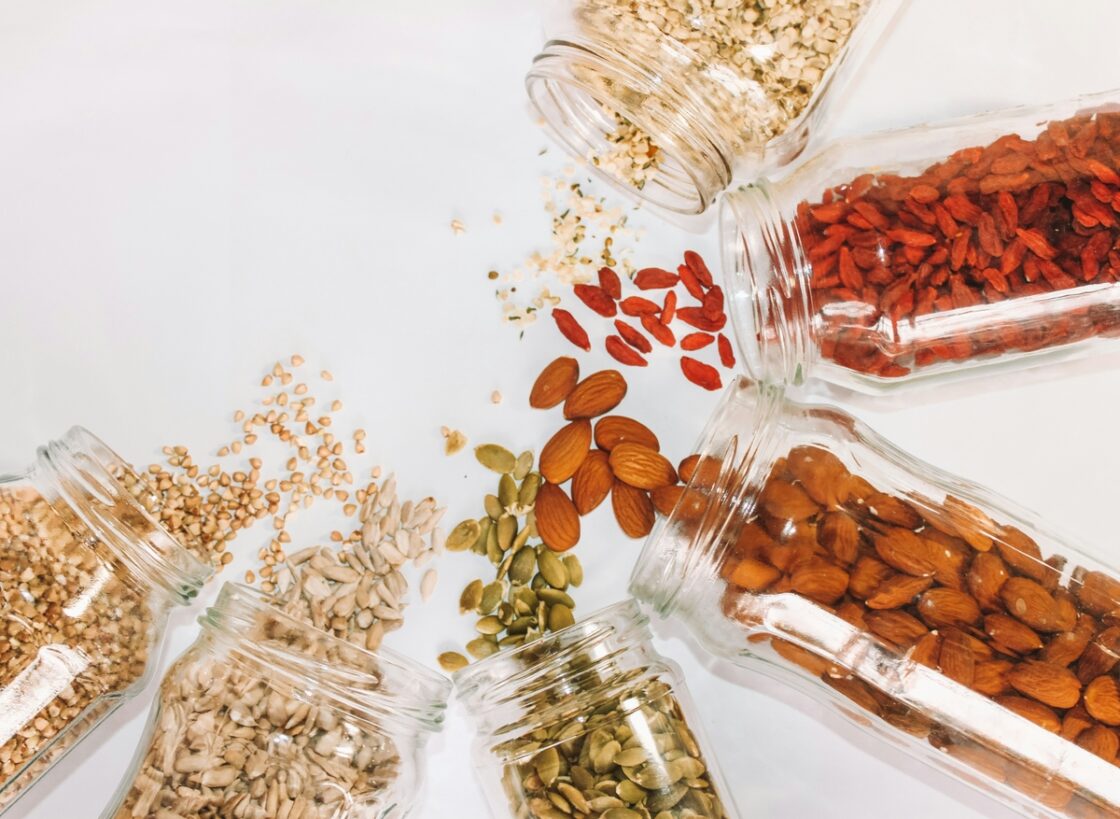10 Foods Rich in Melatonin: The Organic Eater’s Guide to Better Sleep
These 10 foods rich in melatonin could be the answer to naturally unlocking better sleep.

Did you have a goal to become your best, healthiest self this year? If so, there may be one critical thing you’re neglecting in between visits to the gym and your new Mediterranean diet — sleep. Sleep is absolutely essential when it comes to your health, but it often gets neglected for less snooze-worthy trends (pun intended).
If you have problems sleeping, you may have heard that melatonin can help you improve your sleep patterns. This is true, but you don’t necessarily need a supplement to enjoy the sleep-enhancing value of melatonin. Read on to learn more about melatonin, how it can help you sleep, and how foods rich in melatonin offer a natural way to reap these benefits.
TL;DR
- The human body produces melatonin naturally to help regulate our body’s circadian rhythm and our sleep patterns.
- Although melatonin supplements are an option, melatonin can also be found in a variety of foods like dairy, nuts, rice, fish, and certain fruits like goji berries and cherries.
- In addition to eating foods that contain melatonin, you can help support healthy sleep patterns by engaging in sleep hygiene practices and minimizing stress.
What Is Melatonin?
Melatonin is a hormone naturally produced by our brain’s pineal gland to help regulate the sleep-wake cycle1. The amino acid tryptophan is converted to the hormone serotonin, which then undergoes a light-dependent process that converts it into melatonin.
Melatonin is important because it helps our body fall asleep and engage in healthy sleep patterns. And of course, without healthy sleep patterns, we can’t live healthy lives. The Sleep Foundation reports that sleep is necessary to the health of focus, concentration, emotional regulation, energy conservation, growth hormone release for tissue growth and repair, and immune function2.
What Does Melatonin Do?

Melatonin has several key functions that help regulate your sleep.
- Lowers Body Temperature: Melatonin slightly lowers your core body temperature, which is associated with the onset of sleep.
- Circadian Rhythm Regulation: Your body’s melatonin production is awakened by darkness (and suppressed by light). When light levels decrease as the sun goes down, your pineal gland slowly releases melatonin to let your body know it’s time for bed.
- Nervous System Benefits: Melatonin helps calm our central nervous systems, which promotes relaxation as we ease into sleep.
- Sleep-Wake Timing: Melatonin acts as a synchronizer, helping us align our sleep-wake timing with the natural cycle of the day.
The Benefits of Melatonin Beyond Sleep
Melatonin also provides benefits beyond just sleep. According to recent research, these include weight and metabolic disease management, as well as antioxidant, anti-aging, and anticancer properties3. The National Center for Complementary and Integrative Health also reports that consuming melatonin can help relieve the symptoms of jet lag, as well as anxiety before and after surgery4.
The Impact of Melatonin-Rich Foods
Outside of natural melatonin that our body produces via amino acids, we can also directly consume melatonin to help our sleep patterns. While this can be in the form of supplements, melatonin is also available to us in a variety of foods — and these foods can have far-reaching effects. Health experts from the National Council on Aging report that consuming foods high in melatonin and serotonin, which are both pieces of the melatonin production process, can help improve sleep patterns5.
A 2023 study in Nutrients also found that a higher intake of foods containing melatonin wasn’t just associated with better sleep quality — it also was linked to lower levels of depression and a lower risk of abdominal obesity6.
Another 2024 cross-sectional study of older adults in Nutrients looked at the relationship between the intake of melatonin-rich food and different lifestyle factors. Results of this study showed that a higher intake of melatonin-rich foods was linked to greater life satisfaction, as well as a decrease in the cognitive impairment and psycho-emotional state of older adults7.
The Top 10 Organic Foods Rich in Melatonin

If you’re having issues sleeping but you have trouble remembering to take supplements (or just don’t like the idea of taking them!), then melatonin-rich foods could be the answer. So what foods have melatonin? The list below will provide some natural sources of melatonin that you can incorporate into your diet to help you sleep better8.
- Tart cherries and cherry juice can provide a unique way to consume melatonin in beverage or fruit form.
- Nuts, particularly pistachios and almonds, can provide melatonin — and they’re also a good source of fiber and protein for any balanced diet.
- Milk and dairy products like yogurt, cheese, and cottage cheese can provide a rich source of both protein and melatonin.
- Mushrooms sliced raw in salads, sauteed in a pan with olive oil, or cooked in stews and soups can provide a versatile source of melatonin.
- Fish, particularly sustainable options like wild-caught fish options, can provide a protein-rich and antioxidant-rich source of melatonin.
- Goji berries are an antioxidant-rich fruit you can enjoy raw or dried as a sweet source of melatonin.
- Eggs, particularly pasture-raised options (which research shows have a lower omega-6: omega-3 ratio and are higher in vitamin E, vitamin D, and carotenoid content) can provide a melatonin food source to be enjoyed for breakfast or sliced on salads9.
- Rice, especially whole-grain rice, is a fiber-rich melatonin food source.
- Oats, prepared with milk or nut-based milks can provide a comforting source of melatonin.
- Fruits like bananas, tomatoes, and apples can provide a good source of melatonin that can also offer antioxidants, potassium, and fiber.
Foods to Avoid Before Bedtime

While there are foods that help with sleep, there are also foods that may disrupt sleep. Examples of such foods include10:
- Caffeine can keep us awake and disrupt the sleep-wake cycle that melatonin works to regulate
- Alcohol can disrupt restorative sleep patterns and worsen sleep issues like sleep apnea and sleepwalking
- High fat foods can reduce the body’s sensitivity to the brain chemical orexin. Orexin, like melatonin, has a critical role in regulating the sleep-wake cycle — just in the opposite direction. Orexin neurons promote alertness and wakefulness, and foods that interfere with the body’s natural regulation can disrupt your sleep clock.
- High protein foods, which take the body longer to break down than other foods
- Spicy foods that can cause acid reflux and heartburn
- Foods high in sugar like candy, cookies, cake, and sweetened beverages can cause blood sugar spikes — followed by crashes that may cause you to wake up during the night as your blood sugar levels drop
According to sleep experts, you should try to avoid eating all foods roughly two to three hours before bedtime11.
Creating a Melatonin-Rich Meal Plan
If you want to structure your diet around a number of different melatonin sources, here’s a healthy, balanced meal plan that could help promote regular sleep.
Breakfast
- (2) scrambled eggs cooked in a teaspoon of olive oil
- ½ cup cooked oatmeal topped with diced apples and cinnamon
- One cup milk
Lunch
Baby spinach salad with:
- Sliced mushrooms
- Dried goji berries
- Sliced almonds
- Topped with shredded cheese and vinaigrette dressing
Dinner

- Baked fish filet
- One cup steamed rice
- One cup steamed vegetables
Snacks Throughout the Day
- Banana
- Apple
- Salted pistachios
As you can see, it’s not just pre-bedtime meals to consider — you can consume melatonin-rich foods any time of the day to reap the benefits.
Beyond Food: Natural Ways to Boost Melatonin
Besides eating foods with melatonin, there are other lifestyle behaviors you can adopt to help you boost melatonin levels and improve your sleep. One such behavior is managing your light exposure12. In order to assist the body in producing enough melatonin to induce sleep, it’s crucial to limit your exposure to any light sources at least an hour before bedtime.
Sleep experts from the Sleep Foundation report limiting screen time from sources like phones, computers, and television screens, as well as using blackout curtains or dimmable bedroom lights are all important to develop healthy sleep hygiene13.

Other sleep hygiene practices include:
- Keeping a consistent bedtime routine
- Cultivating healthy habits during the day like staying active, avoiding smoking, receiving exposure to daylight, and limiting alcohol intake
- Cutting down on caffeine in the afternoon and evening
- Avoiding late-night eating
Along with these sleep hygiene practices, you should also aim to minimize stress during the day, so you can relax enough in the evening to induce sleep. A 2025 study in Early Intervention in Psychiatry shows that evening-type undergraduates with higher perceived stress exhibited poorer sleep quality14.
Similarly, another 2025 study in the Journal of Evaluation in Clinical Practice found there was a moderate positive relationship between sleep quality and stress, sleep quality and anxiety, and sleep quality and depression15. In other words, the more you take care of your mental health, the better your sleep — and vice versa!
How Much Melatonin Do You Need?
Now that you know melatonin can help you improve your sleep and overall health, you may wonder how much melatonin you need to consume each day to reap the benefits. This daily intake suggestion will depend on whether you consume melatonin through natural versus supplement forms of melatonin.
Melatonin Dosage for Supplements
When it comes to melatonin supplements, health experts from the Cleveland Clinic suggest starting with a 1 milligram dose about an hour before bedtime to see how your body reacts to it16. You can consume more if needed to induce sleep. Experts recommend taking melatonin supplements only in the short term (one to two months or so) to help develop healthy sleep patterns, since long-term effects are unknown17.
Melatonin Dosage for Natural Sources
When it comes to foods that naturally contain melatonin, there is no recommended daily value or upper limit18. Therefore, there is no need to track the amount of melatonin you consume through food each day.
You can consume a variety of foods alone or in combination to help you achieve optimal melatonin levels daily to help support sleep. For example, you could consume a glass of milk and a handful of sour cherries a few hours before bed to help induce sleep19. Or you could have some pistachios and dried goji berries for an evening snack to help support sleep patterns. Try a few combinations out and see what works best for you.

Although consuming melatonin from natural food sources is ideal, there may be situations in which melatonin supplements are best for you. For example, if you don’t have access to a lot of foods rich in melatonin due to food budget, allergies, or intolerances to melatonin-rich foods, supplements might be the better choice for you.
FAQs About Foods Rich in Melatonin
When should I consume melatonin-rich foods?
You can consume melatonin-rich foods any time of the day, depending on the benefits you wish to reap from them. If you’re looking to enhance sleep patterns, then it may be beneficial to consume most of your melatonin-rich foods closer to bedtime. However, research is still mixed on the optimal time to consume melatonin for various benefits.
How should I prepare melatonin-rich foods?
You should prepare melatonin-rich foods just like you prepare any food. There is no reported recommendation for the daily maximum intake of melatonin-rich foods.
How can I combine melatonin-rich foods for sleep-enhancing meals and snacks?
You can combine melatonin-rich foods in many ways to consume sleep-promoting (and tasty!) snacks and drinks. Some examples of this include:
- Preparing oatmeal with milk and topping with berries
- Topping salads with nuts and dried goji berries (or eating the same foods together as a form of trail mix)
- Drinking a tea-like beverage that combines warm milk and tart cherry juice
Conclusion and Key Takeaways
Sleep is vital to the proper functioning and health of our body. Melatonin can provide the support we need to help establish healthy sleep patterns and in turn, feel our healthiest each day.
Instead of adding yet another gummy or capsule to your daily routine, try consuming melatonin through a variety of delicious foods that feature this sleep-regulating hormone.
Sources:
- https://www.ncbi.nlm.nih.gov/sites/books/NBK534823/
- https://www.sleepfoundation.org/how-sleep-works/why-do-we-need-sleep
- https://link.springer.com/article/10.1007/s10787-025-01751-9
- https://www.nccih.nih.gov/health/melatonin-what-you-need-to-know
- https://www.ncoa.org/article/foods-that-help-you-sleep/
- https://pmc.ncbi.nlm.nih.gov/articles/PMC10420797/
- https://pmc.ncbi.nlm.nih.gov/articles/PMC11013436/
- https://pmc.ncbi.nlm.nih.gov/articles/PMC5409706/
- https://pmc.ncbi.nlm.nih.gov/articles/PMC9658713/
- https://www.hopkinsmedicine.org/health/wellness-and-prevention/better-sleep-3-simple-diet-tweaks
- https://www.thensf.org/get-healthy-sleep-by-eating-right-on-schedule
- https://www.ncbi.nlm.nih.gov/books/NBK550972/
- https://www.sleepfoundation.org/sleep-hygiene
- https://pubmed.ncbi.nlm.nih.gov/39718024/
- https://pmc.ncbi.nlm.nih.gov/articles/PMC11752410/
- https://health.clevelandclinic.org/melatonin-how-much-should-i-take-for-a-good-nights-rest
- https://health.ucdavis.edu/blog/cultivating-health/melatonin-and-your-sleep-is-it-safe-what-are-the-side-effects-and-how-does-it-work/2025/02
- https://pmc.ncbi.nlm.nih.gov/articles/PMC5409706/
- https://ift.onlinelibrary.wiley.com/doi/10.1111/1750-3841.14952

